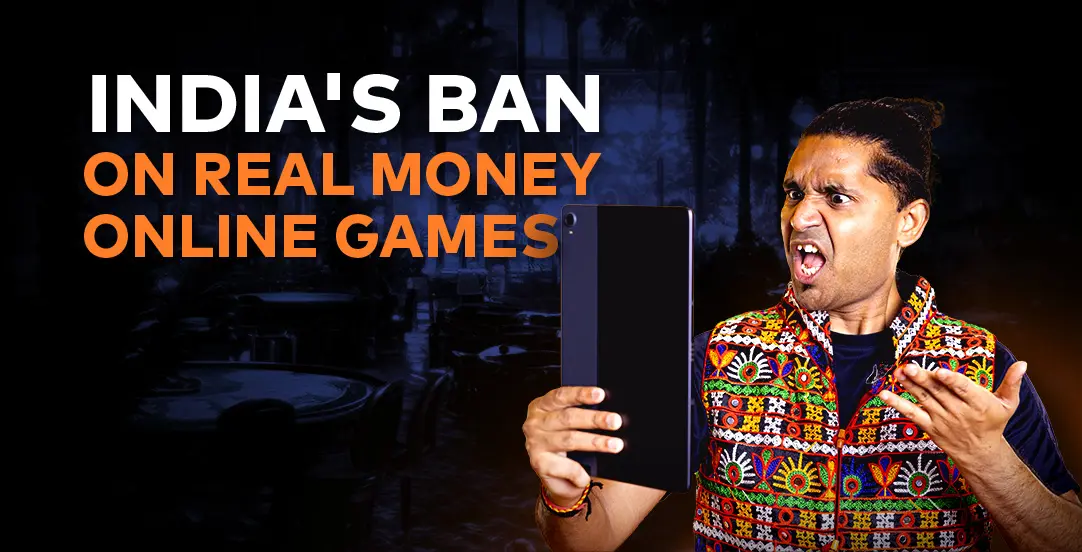India’s ban on real money online games

In a move that will reverberate across India’s digital entertainment sector and beyond, Parliament has enacted the ban on real money online games, triggering major consequences for players, operators, and the wider economy. As an iGaming analyst with a keen eye on market trends and cultural impact, I find it vital to decode both the immediate fallout and the deeper societal shifts this landmark legislation is set to unleash.
New law redefines digital gaming and public policy
The recently passed Promotion and Regulation of Online Gaming Bill, 2025, now prohibits all forms of online gaming involving money, stakes or any financial reward. This broad definition encompasses popular formats such as fantasy sports, poker, rummy, online lotteries, and virtually every game requiring a monetary deposit. Notably, “real money games” are now illegal to operate or promote, and financial institutions are barred from processing any related transactions.
However, there is a clear distinction: esports and educational games are expressly excluded from this broad net, reflecting the government’s attempt to support certain innovative or “socially constructive” gaming formats while cracking down on perceived harms.
Why this sudden and sweeping crackdown?
Government officials have defended the ban as a necessary protection for the public from “addiction, fraud, and exploitation.” According to estimates, more than 450 million Indians participate in online real money gaming, losing nearly RS 20,000 crore per year through these platforms. The Ministry of Electronics and Information Technology further contends that the bill aims to separate “innovation” from practices considered predatory, emphasizing continued investment in esports and education-focused games.
Underlying these concerns is India’s longstanding struggle with fragmented and loosely regulated gambling laws at both the state and national levels. By instituting a nationwide regulatory body, the government hopes to centralize oversight and mitigate the risks associated with illicit or unevenly governed gambling activities.
Industry reaction and the shadow of unregulated markets
The response from the gaming industry has been one of shock and distress. Global operator Flutter Entertainment and local heavyweight Dream11 have both halted operations, a move underscoring the law’s reach and efficacy. Notably, operators were given no chance for public comment or adjustment, with the bill passing through both chambers of Parliament and receiving presidential assent at record speed.
“By banning all forms of online real-money gaming, including skill-based games, the bill risks driving players to unregulated markets, where consumer protection and oversight are minimal,” cautions Manav Bhargava, a specialist in Indian gaming law. This concern is echoed by Flutter CEO Peter Jackson, who notes the four years and significant local investment that the company put into responsible, skill-based gaming through its subsidiary Junglee. With its Indian operations having been set to generate nearly $200 million in revenue this year, Flutter’s exit signals a dramatic shift in the business landscape.
Economic fallout reaches far beyond operators
The online real money gaming sector was valued at approximately RS 2 lakh crore, with annual revenues of RS 31,000 crore and contributing RS 20,000 crore in taxes. Industry organizations warn that the new ban may lead to over 200,000 lost jobs and force around 400 companies to close, inflicting a significant blow to India’s ambitions as a global gaming technology hub.
But the ripple effects are even wider. Dream11, which was among India’s largest fantasy sports companies and had served as the national cricket team’s chief sponsor, has been forced to terminate its $41 million sponsorship agreement with the Board of Control for Cricket in India. Together, Dream11 and My11Circle accounted for roughly $125 million in annual cricket sponsorships. Their sudden withdrawal leaves the national teams scrambling for replacement deals just weeks before major tournaments, highlighting the tightly woven relationship between digital gaming and broader cultural institutions like sports.
Regulation versus prohibition: contrasting models in Asia
India’s new stance stands in stark contrast with regional trends. Neighboring Sri Lanka has recently expanded its gambling regulations through a new Gambling Regulatory Authority Bill, aiming to broaden market participation and economic benefit. Thailand’s efforts to regulate land-based casinos, though stalled, further illustrate the appeal of regulation over outright prohibition in parts of Asia.
Elsewhere, some voices in the Philippines are calling for similar legislative action, suggesting a broader ideological debate is playing out across the region, with issues of social risk, economic growth, and law enforcement all in the balance.
The way forward: balancing economic opportunity and consumer protection
The Indian government insists that its sweeping ban serves the public interest, aiming to shield citizens from the dangers of addiction and fraud while fostering a more sustainable digital future. Proponents point to the continued support for esports and educational initiatives, such as the Indian Institute of Creative Technologies and regional Centers of Excellence, as proof of a pro-innovation stance.
Yet critics argue that prohibition may prove counterproductive. As seen in other markets, bans often fuel the underground, pushing consumers into the arms of unlicensed operators who pay no taxes and offer few protections. Industry proponents believe regulation, rather than prohibition, would better balance economic development with player welfare, creating jobs, encouraging foreign investment, and supporting responsible gaming frameworks.
What industry leaders are doing next
Major operators now face the daunting task of reallocating resources, absorbing revenue shocks and non-cash impairments, and charting a new course for both employees and products. Flutter, for instance, is exploring legal avenues to reinstate constitutional protections for skill-based games, though it has already commenced the difficult process of shuttering Indian operations and reviewing the financial impact.
The focus for the industry will likely shift toward advocacy, exploring ways to align skill gaming with permissible formats, or even lobbying for regulatory reconsideration in the future. The coming months may also see players gravitate toward unregulated markets, a dynamic that regulators and companies alike must monitor closely for emerging risks.
Conclusion – a watershed moment for India’s digital gaming landscape
India’s ban on real money online games marks an unequivocal turning point for the nation’s iGaming sector. By addressing core concerns around social harm but also potentially sacrificing economic momentum and consumer protections, the country has placed itself at the heart of a regional and global debate, the quest for the right regulatory model. The stakes extend from technology innovation and job creation to the very fabric of India’s sporting and cultural universe. As this story unfolds, it will serve as a critical case study for policymakers, businesses, and players worldwide, revealing much about the future of digital entertainment in an increasingly interconnected world.




















